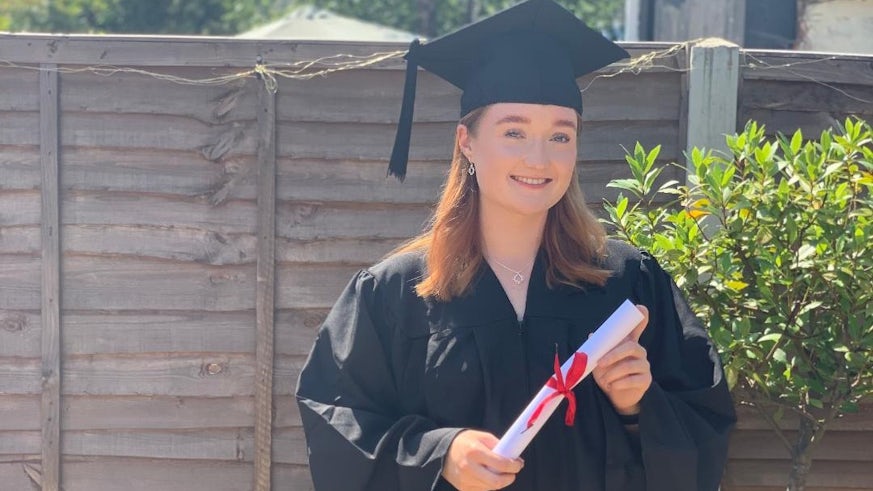Student overcomes COVID-19 challenges to graduate with a First Class Honours degree in Biochemistry
27 July 2021

Lily Thomas’ Professional Training Year was cut short by the pandemic, forcing a sudden departure from Italy where she was working on the generation of a novel, fully biodegradable wound dressing
Like all students, Lily Thomas has faced no shortage of challenges brought about by the COVID-19 pandemic.
In 2020, Biochemistry student Lily was part-way through a Professional Training Year (PTY) at the University of Pisa’s School of Chemical Engineering. PTYs provide an opportunity for students to gain twelve months of work experience, often in a laboratory setting.
“After completing a laboratory-based summer project, I really wanted to conduct an extended research project to see if research was a possible career path was for me. I aimed to really push myself by conducting a project in a very different field, but one that brings together many disciplines.”
Lily participated in the PolyBioskin project, which involved generating a fully biodegradable wound dressing by spinning nanofibers and coating them in nanoparticles. The dressing will be used for patients with chronic sores, such as those seen with diabetes, to prevent infection, reduce inflammation and allow healing, while avoiding scarring.
With the onset of the pandemic, Lily had to leave Italy suddenly. The closure of the University of Pisa meant she had no access to her data and she was forced to wait until new working practices, including over Zoom, enabled the finalisation of the project.
Despite the setbacks, the project was extremely successful with a prototype found to have promising anti-inflammatory and wound healing properties. Lily also co-authored her first scientific paper.
Lily’s return to Cardiff in September 2020 was a very different experience to that of previous years. She initially found it very difficult to stay motivated and to strike a balance between studying and relaxing, confined to one room.
“I really had to timetable my days to ensure a work/life balance. With the final year being a stressful year anyway, it somehow seemed even worse not being able to be in the learning environment I was used to. I think the staff and students adapted as best as they could and overall, I have had a valuable learning experience this year and really enjoyed the modules I selected! My personal tutor and module lecturers were extremely supportive and understanding which really made this year the best as it could be.”
Lily’s efforts more than paid off and she is graduating with a First Class Honours degree in Biochemistry.
She says: “I really loved the laboratory based parts of the degree which was a big surprise to me; my highlights have to be the week long practical session in second year working on a therapy for Cystic Fibrosis and conducting my final year project investigating part of a membrane protein, P2X7.”
Lily is going on to study a PhD at Cambridge University’s MRC Toxicology unit. Her project will focus on chromatin structure and gene transcription in cellular stress and the findings will contribute to research in the fields of cancer and inflammatory diseases.